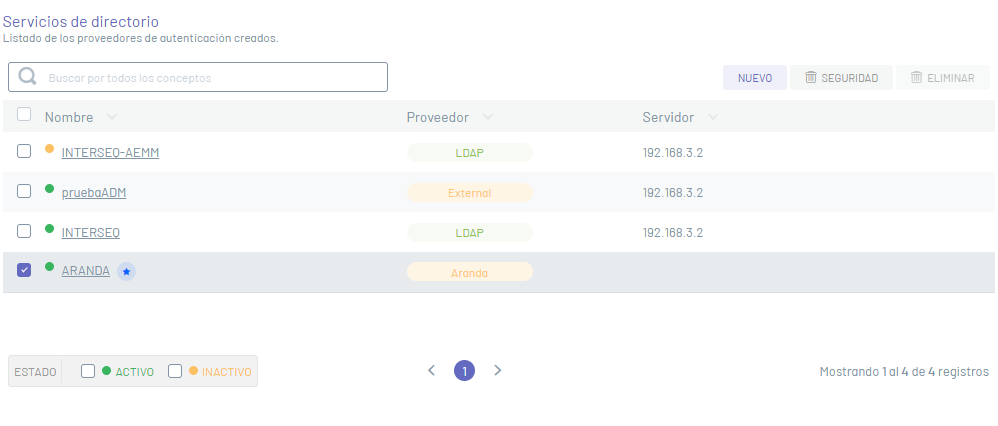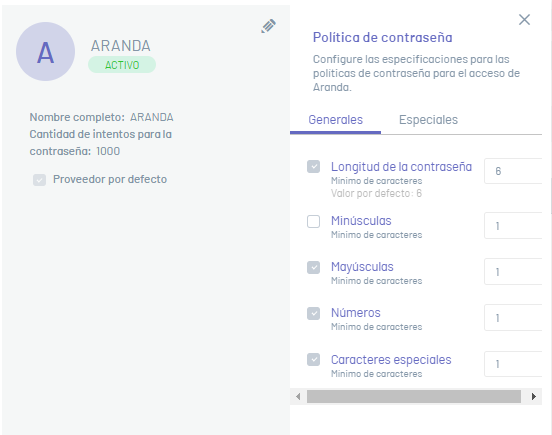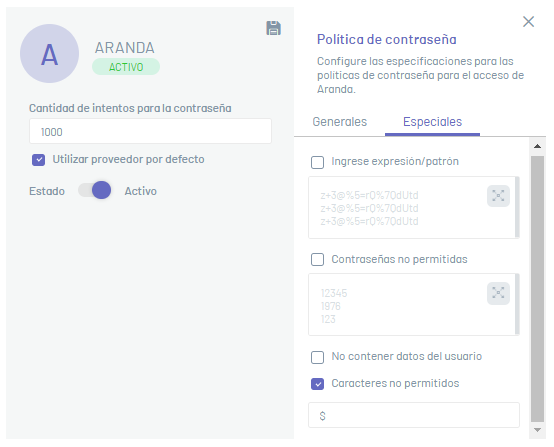The type supplier Aranda is the default provider of the system, the settings that are configured for this provider affect users who are of this type of provider.
1. To configure provider options, in the directory services information view, select the type provider record Aranda .

2. In the Aranda Provider Detail view, click the Edit  to modify the required information according to the business rules or needs of the client, enabling the controls in each type of policy and setting the values for each option.
to modify the required information according to the business rules or needs of the client, enabling the controls in each type of policy and setting the values for each option.

3. A continuación se presentan las opciones disponibles en el proveedor tipo Aranda:
| Field | Field Type | Description |
|---|---|---|
| Name Change | Text | Allows you to change the name to a custom one. |
| Number of attempts | Text | In this option you can configure the maximum number of attempts to enter the password, before blocking the user. |
| Use Default Provider | Selector | If selected, it will be the user’s initial choice at the time of authenticating to the Login. |
| Password Policies | Multiple | You will be able to configure the specifications for the Password Policies |
⚐ Note:
- If you change the name of the type provider Aranda, make sure the name is the same on all the products you have installed (ADM, AFLS, ASMS, etc.), to ensure that the integrations work correctly.
- Example: If you have ASMS and ADM installed, and you need to change the name of the type provider Aranda to internal, validate that the name is equal to internal.
Configure Password Policies
3. On the General In the Password Policies section, you can modify the number of characters in parameters such as password length, lowercase, uppercase, numbers, and special characters.
4. On the Special In the Password Policies section, you can configure the password’s special allowed and disallowed characters.
⚐ Note: The password field defined during the configuration process of Aranda Users, must comply with all Password requirements
5. Click Save  to store the new specifications of special and/or general password policies.
to store the new specifications of special and/or general password policies.
⚐ Note:
- Password policies apply only to users created in the local directory (Aranda).
- When you modify password policies, they will be enforced for the creation of new users or when changing the password of existing users in the local directory.
Password Policies

General Policies
These types of policies are mandatory and users must comply with them in order to create their password.
| Field | Field Type | Description |
|---|---|---|
| Password length | Numerical | The password must be the length set by the administrator. |
| B | Numerical | Requires that the password be one or more lowercase characters. |
| B | Numerical | Requires that the password be one or more uppercase characters. |
| Numbers | Numerical | Requires the password to have one or more numeric characters. |
| Special characters | Numerical | Requires the password to have one or more special characters. |
Políticas Especiales
Estas políticas son restrictivas; si la contraseña del usuario coincide con una de las políticas especiales NO se podrá usar esa contraseña
| Field | Field Type | Description |
|---|---|---|
| Expression/Pattern | Text | It allows you to determine regular expressions to avoid the use of patterns in passwords; To define multiple expressions, they must be separated by a line break |
| Password Not Allowed | Text | List of passwords that cannot be used. To set multiple disallowed passwords, they must be separated with a line break. |
| Password with user data | Selector | It does not allow the username to be used within the password. |
| Passwords with disallowed characters | Text | The use of the indicated characters is not permitted. To define multiple characters, type one followed by the other without spaces. Example: #% It will not allow the use of any of the #, or % in the password |
⎘ Related Links:


